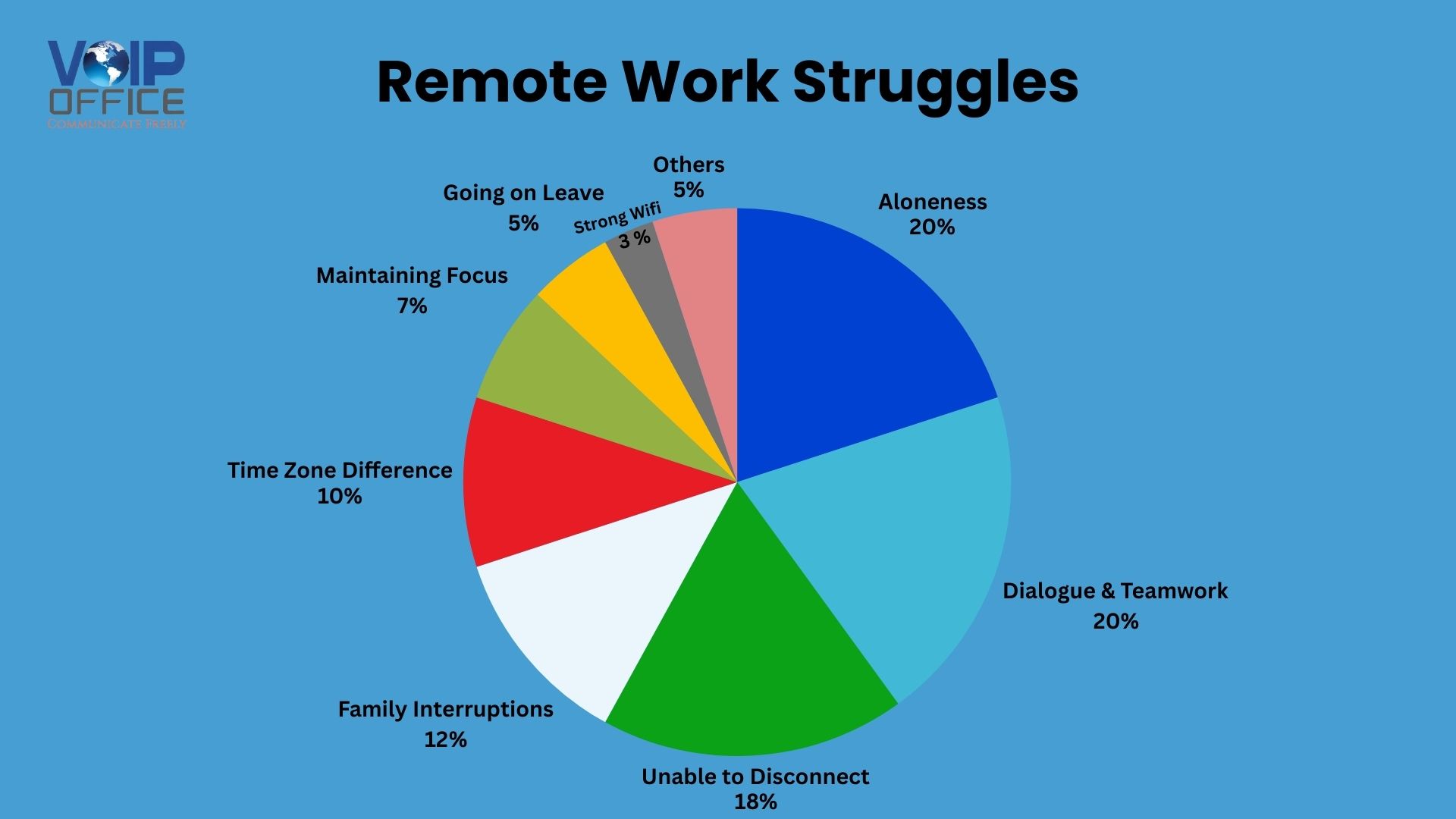Whenever a virtual team works, they do have to overcome some real work challenges, as they are working remotely. But many are aware of the benefits of remote work. One main reason is that there is no need to travel between home and office. There will be no colleagues or managers policing around. Moreover, on the humor side, the lunch box is going to be safe.
As per the website Backlinko.com, it was stated that around 22.8% of employees in United States have opted for working remotely at least on part time basis. That was around 35.13 million of human people.
Years back, especially during the COVID-19 pandemic time period, many employees were working from home. At that time, many had to face various challenges and came to realize that, remote work from home is not always about, sunny and roses.
As per report from Flexjobs.com website, in their article regarding remote Work Statistics and Trends. It was mentioned that around 95% of working professionals wanted remote work in one way or another. It could be either in hybrid form or fully remote. Along with that remote workers were more vulnerable if there exists weak team, longer working hours and the usual occasional work from home distraction.
Around 56% felt that a remote work is good for their mental health, while 43% felt that a hybrid workplace is better for their mental health. Whereas, only 1% felt that working the job full-time in office is best for their mental health.
Even though remote work does offer benefits, it also provides challenges for employers and employees, who would have to steer reasonably. As per the RSM International survey, along with the US Chamber of Commerce in the year 2023, it showed that around 61% of the employees working remotely felt isolated, whereas around 56% had cited productivity as a big challenge.
Above all, it is interesting to note that all these challenges do have solutions. Hence, whether an employee is planning to work remotely or is already working remotely, they will get more work done, provided they meet all challenges head-on.
Remote Work Struggles
A few remote work challenges that the employees face daily are
Juggling Duties
In theory, juggling duties that include work and personal life becomes easier for remote workers, as travel to and from work is not necessary. But as per actual, it is opposite.
It is mainly because there are no physical boundaries in their work timing, and then office work starts slowly creeping into personal time. Even family members at home could be the cause of work interruption. It becomes essential to highlight the need for placing boundaries, as it helps to minimize all sorts of interruptions.
Around 40% of remote employees check their emails more frequently than office-going employees.
Technological Problems
Working remotely greatly depends upon the available technology. But not all have a perfect technology setup at home. Outdated devices, unstable internet, and various other software issues could destroy productivity as there is no immediate office IT support. Troubleshooting will be solely dependent on the employee working remotely.
In addition, if an employee works in a rural area, they might struggle with a slow broadband internet connection. A few others might face financial difficulties upgrading their existing system at home.
Therefore, it is always essential to have a backup plan, like a mobile hotspot or even an extra device, to help avoid any significant disruption when any technical issue arises.
Miscommunication
Miscommunication or improper communication is considered the biggest challenge for the teams working remotely. In their book “REMOTE: Office Not Required,” written by Jason Fried and David Heinemeier pointed out,
Since face-to-face interactions do not happen, slight misunderstandings could arise quickly. This could make employees working remotely feel left out of essential communications occurring in the office.
Sometimes, brief messages may come across as cold or even sound negative when, in reality, they were meant to be logical. Time zone differences create gaps in communications that slow down critical decision-making.
Even though there exist platforms like chat, email or even video calls, it sometimes does have their own drawbacks. Proactive communications are the best key to overcome these challenges. Along with that adopting a culture that gives importance to all team members from all time zones helps a lot.
Feeling Alone, Left Out & Stressed
Most of the employees while working from office socialize with their colleagues at the office premises. Whereas when at remote work, it does away with voluntary, friendly conversations that naturally happens in office. Like talking over lunch breaks, near coffee machines or chatting near the work desk. These moments, helps in continuing and building relationships that never happens at remote work.
Remote workers work alone from their homes or from outside the office, due to which a few could feel left alone and develop stress and depression when compared to their hybrid or in-office colleagues. These varies from person to person.
Few employees may welcome working in solitude at the starting stage of their work but later may experience negative effects due to long extended isolation from the office over a period of time.
Difficulty in Professional Growth
Employees working remotely struggle to become visible, which makes the growth of their career taxing. During remote work, there never exists mentors to cross-check the work done, there is no inter-person interactions, and more over leadership exposure requires extra effort.
Balance Focus & Performance
Working remotely, outside the office or from home, could have unwanted distractions. These could include pets at home, kids running around, doing household chores, or unexpected visitors turning up at the front door.
Since the basic structure of office is not there, balancing the focus really requires a disciplined life. Mainly because remote workers could delay the work, as personal tasks could easily take over the balanced work life.
Many remote workers struggle to manage their work time efficiently, as there is a tendency to work too little or even too much. Therefore, it is essential to create clear boundaries, like a dedicated workplace at home. Communicating expectations with family regarding work privacy could also help maintain an efficient balance with productivity.
Mental Wellness
Remote work could slowly lead to seclusion from the existing work, which affects the mental wellness, that will affect the work productivity in the long run.
Remote workers should move around, take regular breaks, and gain access to support systems to relieve stress. This could greatly boost their morale.
Open communications and a stigma-free work culture will help remote teams stay interconnected. By focusing on mental wellness, remote workers could help themselves develop a healthy and worthwhile work environment.
Employer Challenges At Remote Work
Many came to realize that, working remotely is an absolute challenge for employees, as well as employers alike. They have to navigate around the complex problems of making sure to keep the remote teams engaged and connected, so that they could be more productive.
Data Safety Issues
Since work from home networks are not fully secure like the office Wi-Fi networks, remote work does face an increased security risks. If proper data safety measures are not followed, then the sensitive data, such as financial details and various details of customer records, could get exposed.
Therefore, companies must make sure to maintain the compliance with different data protection laws and then maintain a clear security policy with regard to data safety.
Providing remote workers with on-time cybersecurity training helps employees prevent and protect valuable information breaches.
Productivity & Supervision Challenge
Unwanted trust issues creep up, and managers depend on over monitoring the employees’ remote work. Balancing supervision with proper determination will help keep the remote teams engaged and produce productive work.
Traditional methods of measuring work performance, like tracking the number of hours worked, can never be helpful in remote work settings. Instead, assessing employees’ worth based on the number of tasks or projects they complete is a better way to assess their overall work performance.
Keeping Teams Connected
Building and maintaining the company culture is difficult without interpersonal interactions. Planned efforts are required for remote teams to share their knowledge, bond, and engage socially.
During remote work setup, it is essential to have unplanned teamwork for solving problems, as it provides structure for virtual settings. For the teams to stay connected and accountable, it is important to meet the deadlines, have clear expectations, and have on-time check-ins, while working.
Preserve Company Identity
Preserving the company identity helps maintain the company culture, as remote work teams require deliberate efforts to build engagement and connections.
Casual meetups, virtual activities, or even shared online spaces help strengthen the bonds of the remote team. This creates various opportunities for employees to share their ideas, job thoughts, and other analyses more openly.
It helps to provide a platform for proper discussions between staff and management, guaranteeing transparency while addressing all types of issues regarding encouraging a sense of active participation during company decisions.
Fair Team Management
Be it remote working or even hybrid working, it does create an issue of fairness at the office. Since in-office employees are regularly seen every day, they get more visibility and career growth due to proximity bias.
Remote workers face various challenges regarding work-life balance, engagement, and job accountability. It is the managers’ responsibility to ensure equal participation of all team members during meetings, which helps in effective decision-making.
Attentive company policies help address the issues concerned with differences in work time zones and design a level playing field, so all employees have a fair chance to succeed.
Always Within Reach
Giving employees the required training, with the right tools and proper support, helps improve job satisfaction and productivity. Remote workers could benefit significantly from the company’s equipment, responsive IT support, and regular software training.
Frequent evaluation helps identify and fix resource gaps, which helps remote workers work efficiently. Various other guidelines and important rules have to be well-defined, as this make sure that all employees, whether working remotely or working from the office, are always on the same page, while working towards achieving their common goals.
Solving Remote Work Challenges
Both employers and employees must work together to make remote work successful. Employees can stay connected via online chats and communities, which helps to set clear work-life boundaries. Having a dedicated workstation helps to maintain the balance through fixed work hours.
A dedicated workspace and defined work hours help maintain balance. Common challenges include tech issues, overwork, and staying engaged.
Employees Action
- Regular check-ins to maintain perfect virtual connections.
- Setting clear-cut work-life boundaries with customized routines & workplaces.
- There should exist clarity in digital interactions through active communications.
- The technology and IT support should be updated whenever needed.
- They should track achievements and request feedback for growth in their career.
Employers Action
- Make healthy connections by hosting virtual team-building events.
- Explain communication rules and response times.
- Making use of precise project management tools.
- Provide on-time IT support and offer stipends.
- Provide training and administer strong cybersecurity measures.
- Address proximity bias to ensure fair treatment of employees.
Conclusion
Remote working does have its own challenges, but the right approach with the right tools helps businesses create a fruitful and secure environment. Managing communication gaps, isolations, and technology issues helps employees stay active and well-organized. Companies that offer remote and hybrid work models should remodel themselves to attract top talent and maintain stability in the allocated workplace.
VoIP Office provides a wide range of solutions for effective communication that help support remote teams. VoIP features like instant messaging, video conferencing, and file sharing help to smoothen teamwork. Customizable status and conversion of voicemail to email help promote work-life balance.
By providing a steady and dependable communication tool, VoIP Office allows businesses to build a thriving remote work culture with long-term success.



